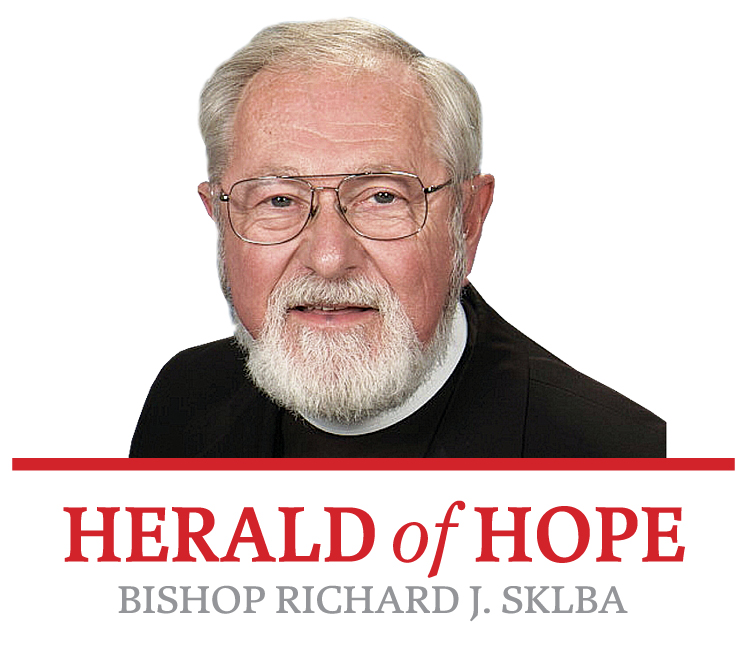 Once again the wonderful American experience, at least for some of us these days, of Thanksgiving Day has slipped from the joyful table to treasured memory. Hopefully, there were delightful family gatherings, some cheerful reunions among folks converging from many directions, possibly the traditional turkey on the table and countless other bits and pieces of life now woven into the fabric of life’s cherished memories. Members of East Side Milwaukee parishes alone this year donated more than 450 food baskets to needy families in order to extend the circle of gratitude and generosity.
Once again the wonderful American experience, at least for some of us these days, of Thanksgiving Day has slipped from the joyful table to treasured memory. Hopefully, there were delightful family gatherings, some cheerful reunions among folks converging from many directions, possibly the traditional turkey on the table and countless other bits and pieces of life now woven into the fabric of life’s cherished memories. Members of East Side Milwaukee parishes alone this year donated more than 450 food baskets to needy families in order to extend the circle of gratitude and generosity.
Each year, that particular day usually also signals the launch of life into the frenzy of traditional Christmas preparation and parties. On the occasion of Thanksgiving, we do give thanks around the table each year, and we are deeply moved by our realization of the blessings we often take for granted. Unfortunately, it’s then all too easy to slip from our fond greetings and festive meals to the rush of Christmas decorating and shopping. This year, the frantic holiday commercialism of our American culture even started the Christmas drum roll in mid-October.
As Catholics, we are encouraged, first of all, to enter Advent’s liturgical season of expectation, not yet Christmas itself, and to sort out what we really need from life and its Lord. That’s why we’re temporarily held back by God’s grace and the Church’s liturgy into the “waiting mode.” This is a time of sustained hope.
As a matter of fact, the actual season of genuine Advent is tied to one’s spirit, not the calendar. Advent occurs, you see, whenever three sentiments converge: 1) a sense of what we really and deeply need (not merely want), 2) the recognition that we are unable to attain that blessing by our own individual human efforts no matter how sustained or valiant, and 3) a conviction that God will provide what we need, but in God’s time and in God’s fashion. If that triple constellation isn’t present, it’s not really Advent. Conversely, whenever the tri-awareness might occur (even if in July or August), it’s Advent.
What’s apparently very important is that we learn again and again, year after year, what it means to wait for God and the graces of taking time to prepare for any and every major event in life — like the birth of a baby — because everything, including our fundamental values, changes in the process.
So much of what we already possess should be topics for deeply held and pervasive gratitude, or “thanks and praise” as our Eucharistic Liturgy often describes it. We Americans need to learn how to turn the casual word of thanks into a way of life. We Catholic Americans have precisely the means to help our world accomplish that shift in thinking. It’s called the season (ideally four weeks in length, depending on the year’s calendar) of Advent, and it’s also called the Eucharist.
Advent is a time to thoughtfully review the history of how God carefully prepared the people of Israel and the larger world (and us) for the arrival of his Son in human form. It’s a time to look backward for a bit and appreciate the journey already taken, like looking into the rearview mirror of our car to see how far we’ve actually come. It’s also a privileged season to look forward and begin, even if ever so slightly, to appreciate what God eventually has in mind for the human race.
For Catholics, gratitude should be a way of life. On the night before he died, knowing full well the converging forces gathering in darkness around and against him, Jesus took bread, blessed it and said “thanks” for the bread and for everything, even for his impending passion and death on the cross as John’s Gospel would have us see it. His sense of gratefulness included absolutely everything, even the rejection of a few of his own people, because for us disciples that action became the eventual means and occasion for the whole world’s renewal and transformation. We believe that the Wisdom of God foresaw everything and used it all for our salvation.
The sacrament of the Eucharist, under its appearance of mere fragile bread, was Christ’s way of saying, “thank you.” Several times a week throughout the entire year, I gather early in the morning with business folks on their way to work. We pause to say, “thank you” to the God of heaven and earth, thank you for everything we do and have and are. That is the entire message in a nutshell, simply a word of gratitude, and that Word gathers us, unites us, transforms us and sends us. That “thank you” is what we become in a sort of expanded act of “transubstantiation.” We not only say thanks in words and gestures, we somehow become thanks. “Thank you” is not only good manners, as our mothers insisted so often, but rather a way of life.
We are convinced that that same sentiment can and will transform our whole world. That’s really what evangelization is all about — helping people learn why and how to say thank you — all year long. Then, God is truly and fully in our midst.
